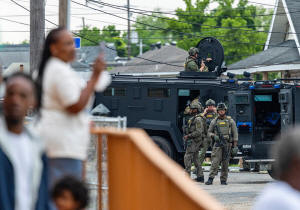Mistrust in law enforcement complicates the search for the New Orleans
jail escapees
[May 23, 2025]
By JACK BROOK and JIM MUSTIAN
NEW ORLEANS (AP) — As authorities scour New Orleans for escapees from an
audacious jailbreak, they are also confronting entrenched mistrust in
law enforcement and the criminal justice system.
Nearly a week after 10 inmates yanked open a faulty cell door inside a
city jail and moved the toilet to squeeze through a hole, five remain on
the lam. The police superintendent has said most of the fugitives were
likely still in the city as more than 200 law enforcement personnel work
to find them.
Complicating efforts is a history of misconduct and racial bias against
Black people by city police, a state police record of excessive force,
and a jail system found to violate constitutional rights.
Officials raised concerns that the men are receiving help from the
community after two people were booked Wednesday on accessory charges
and a third was booked Thursday. Authorities have offered $20,000 in
rewards for tips leading to the arrest of the fugitives, many of whom
were charged with or convicted of violent offenses including murder.
“If we feel like the law enforcement was here to help us, we would help
them,” said Mario Westbrook, 48. He realized only after the arrest of
escapee Dkenan Dennis that he had unknowingly spoken with the fugitive
that day outside a corner store.
Westbrook compared the rush to capture Dennis near Westbrook's home with
the often hourslong law enforcement response times in his neighborhood
in New Orleans East, a long-marginalized stretch of the majority-Black
city.

“Our community, the police come back here, they have no respect for us
as human beings," Westbrook said.
While dropping off a package near where police had cordoned off streets
before capturing escapee Corey Boyd, delivery driver Brandy Peters, 36,
said she was surprised authorities caught anyone "because normally crime
here goes unsolved.”
“If you ask me, they lean more toward the French Quarter area,
protecting and serving there more, making sure that when people come
from out of town, that’s where they are at,” she said of law
enforcement.
Many residents, exasperated with what they see as the incompetence of
city governance, are mocking the outrageous escape. Local clothing store
Dirty Coast, a reliable barometer of the city’s mood, is even selling a
T-shirt based on the inmates’ taunt of “To Easy LoL” written above the
hole where they escaped.
Police say they are improving
In a statement to The Associated Press, Louisiana Attorney General Liz
Murrill described law enforcement as doing “an amazing job in building
trust and relationships in the communities they serve" and working to
apprehend “violent and dangerous” escapees.
The New Orleans Police Department, which tells the public it has
transformed, referred questions to Louisiana State Police, saying it is
leading the search.
The agency “continues to work diligently on improving our relationship
with our communities," state police spokesman Lt. Jared Sandifer wrote
in an email. He added that “all residents are encouraged to cooperate
with law enforcement” to capture the fugitives.
The Orleans Parish Sheriff’s Office, which runs the jail, did not
respond to requests for comment. But Sheriff Susan Hutson said in a
statement earlier this week that she is committed to “protecting our
deputies, protecting the public, and restoring trust in a justice system
that must work for everyone.”
Louisiana lawmakers are considering legislation to require sheriffs to
immediately notify state and local law enforcement and the public of an
escape because of questions about how long that took after the New
Orleans jailbreak.

Police history of racial bias and misconduct
By all accounts, the New Orleans Police Department has seen drastic
improvement over the past decade.
It has been subject to what the city called “the nation’s most
expansive” federal oversight plan since the U.S. Justice Department
found evidence of racial bias, misconduct and a culture of impunity. It
was one of the first major police forces in the U.S. to implement body
cameras.
[to top of second column]
|

Residents watch as law enforcement search for a fugitive that
escaped a prison in New Orleans, Wednesday, May 21, 2025. (Chris
Granger/The Times-Picayune/The New Orleans Advocate via AP)

But residents are five times as likely to hold a negative view of city
police as a positive one, a 2024 survey by the New Orleans Crime
Coalition found.
Some still recall the bullet-riddled early 1990s, when officers were
often the very criminals preying on the city. Dozens of officers were
arrested for bank robbery, rape, auto theft and other crimes as New
Orleans led the country in police brutality complaints.
The low point was arguably 1994, when New Orleans recorded an
unprecedented 421 homicides and saw the patrolman-ordered execution of a
young woman, Kim Groves, who was escapee Derrick Groves' grandmother.
Years later, in the wake of Hurricane Katrina, 20 officers were charged
in a series of civil rights investigations. Officers shot and killed two
unarmed people and wounded four others on the Danziger Bridge in 2005
before orchestrating a cover-up.
Security problems and violence in New Orleans’ jail
City Councilmember Freddie King III lamented during a public meeting
this week that several escapees were first locked up as teenagers and
remained entangled in the criminal justice system as adults.
“Are we doing enough as a society, as a city, to ensure that our young,
specifically Black men, don’t end up in jail?” he said.
For more than a decade, New Orleans' jail had been subject to federal
monitoring intended to improve conditions.
Security problems and violence persisted even after the Orleans Justice
Center opened in 2015, replacing a decaying prison with its own string
of escapes and deaths.
“There’s bad blood and history of bad blood toward Orleans Parish
incarceration systems,” said Stella Cziment, the independent police
monitor of New Orleans.

State police operate aggressively
Cziment also observed that residents may be “reluctant” to work with
Louisiana State Police, which operates with a heavy hand in the city,
including carrying out sweeps of homeless encampments.
The agency has a history of excessive force, detailed earlier this year
in a scathing U.S. Justice Department report. On Wednesday, the Justice
Department announced it was “retracting” the Biden administration’s
findings of constitutional violations.
And this month, Louisiana Gov. Jeff Landry signed a directive to allow
the state’s law enforcement agencies to enforce federal immigration law.
“I think in this current political climate, people might want to think
twice before putting themselves in a situation where they are
unnecessarily interacting with police because our civil liberties may
not be respected,” said Toni Jones, chair of New Orleans for Community
Oversight of Police, a grassroots police accountability network.
‘Almost like a joke’
Tyler Cross, who lives in the St. Roch neighborhood where a SWAT team
unsuccessfully sought a fugitive, sees the jailbreak as indicative of
"significant systemic issues” with the city’s law enforcement and
criminal justice system.
“It’s almost like a joke, which kind of speaks to how people feel about
the police in this area,” Cross said. “The whole situation is just kind
of ridiculous.”
Westbrook, the New Orleans East resident, said police have been “very
active” in his neighborhood since the escape.
“They're looking for somebody for real, so you can't call it
harassment,” Westbrook said. “But we still taking the bite of it in the
backend.”
—
Mustian reported from New York. Associated Press writer Hallie Golden in
Seattle also contributed.
All contents © copyright 2025 Associated Press. All rights reserved |